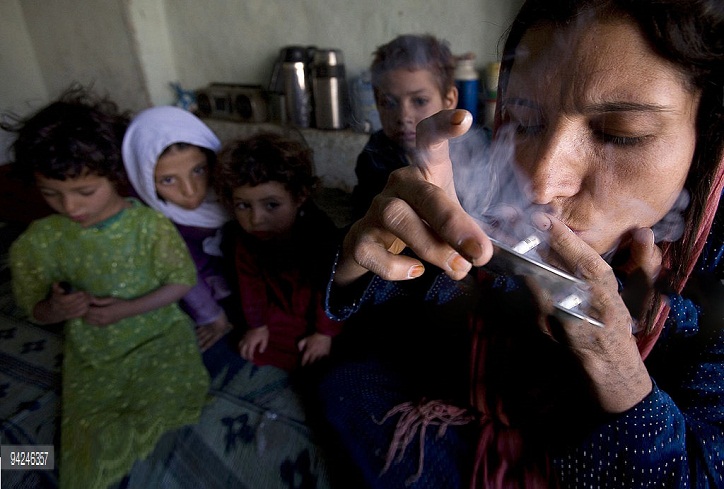
(MENAFN - Pajhwok Afghan News) NEILI (Pajhwok): A number of drug-addicted women, who have been living with addicted men in ruined places of Neili, the capital of central Daikunid, province, say the government should facilitate their treatment so they return to normal life.
According to statistics with the Public Health Department, 25,000 men and 10,000 women and children are addicted to different types of drugs in the province.
A Pajhwok reporter visited an under construction building in Nelli two days back where tens of drug addicts are living.
Under construction buildings, bridges, culverts, parks and cemeteries are places where drug addicts spend their days and nights.
The addicts move everywhere in the city during day and mostly beg to earn money buy drugs. After 5:00pm in the evening, they return to their places of gathering to spend their nights.
The reporter saw Reza Gul, one of the addicted women, in the building filling a cigarette from drugs.
The woman, a resident of Neilli, said she lost her spouse to the conflict and was currently living the half-constructed building with male and female addicts.
Reza Gul said: 'What report will you make of my bad situation. Go and do your work. I have no life except drug.'
But few minutes later she agreed to talk but outside the building. Reza Gul was in hurry to fill her cigarette from drug. Wearing old cloths, she said she could not speak for more than 10 minutes otherwise one should massage her body.
She got married six years ago and after one year of her marriage her husband joined police due to unemployment.
She said after her husband was killed in a clash with Taliban info-icon , her in laws expelled her from home and separated her from her two daughters.
'When they expelled me from home, my own family also refused to get me in. This place became my destiny,' she said with deep sorrow and disappointment.
She asked government authorities concerned to facilitate her treatment so she could return to normal life.
Fatima, not a real name, is another addicted woman. She said her husband was addicted to drug and encouraged her to consume opium.
'Every time my husband used to take drugs, I would fight with him. He also encouraged me to drug to end my opposition.'
After three years, her husband died and she had to leave their house and now she is unaware of her three children.
Fatema did not want to speak more about her personal life and asked the government to provide opportunity for her treatment so she live a normal life.
AIHRC, civil society info-icon organizations concerned over female drug addicts' conditionMubarak Rezaee, head of the Afghanistan info-icon Independent Human Rights Commission (AIHRC), said: 'Living together of women addicts with men drug addicts is a matter of concern for us and it is government responsibility to rehabilitate drug addicts and create special hospital for them.'
He said AIHRC for Daikundi had often contacted relevant authorities for construction of special hospital for women drug addicts.
Laila Hussaini, a civil society activist, said 'It is very unfortunate that the number of drug addicts is on the rise. The government should take stern action to control this.'
Response from officials
Qurban Elham, acting head of the Public Health Department, said 25,000 men and 10,000 women and children were addicted to different types of drugs in Daikundi.
'This statistic is alarming, keeping in view the total population of Daikundi and it is on the increase every year,' he said.
Elham said a 10-bed hospital for treatment of female drug addicts had been built and would be officially launched soon. He said a 20-bed hospital for men drug addict was operational in the province from past few years.
'In case a welfare organization, the governor or his deputy take responsibility for accommodation, food and other expenses, the health department is ready to collect all women addicts and start their treatment until a special hospital for them is official opened.'
Women Affairs Department Director Masuma Hussaini said they could only refer women drug addicts to hospitals and could not provide them more support in this regard.



